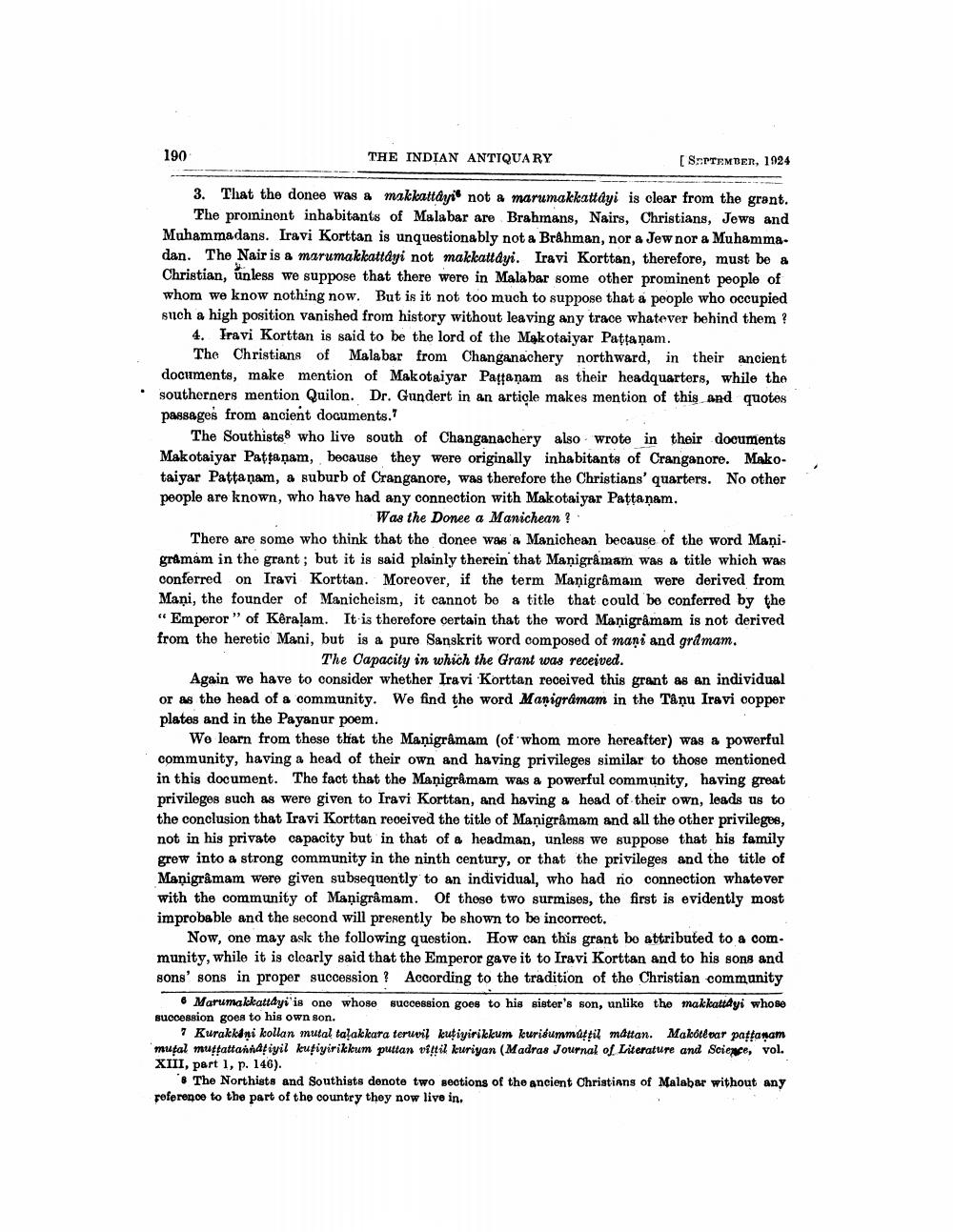________________
190
THE INDIAN ANTIQUARY
[ SETTEMBER, 1924
3. That the donee was a makkattdyis not a marumakkattdyi is clear from the grant.
The prominent inhabitants of Malabar are Brahmans, Nairs, Christians, Jews and Muhammadans. Iravi Korttan is unquestionably not a Brahman, nor a Jew nor a Muhamma. dan. The Nair is a marumakkattdyi not makkattdyi. Iravi Korttan, therefore, must be a Christian, unless we suppose that there were in Malabar some other prominent people of whom we know nothing now. But is it not too much to suppose that a people who occupied such a high position vanished from history without leaving any trace whatever behind them?
4. Iravi Korttan is said to be the lord of the Mekotaiyar Pattanam.
The Christians of Malabar from Changanachery northward, in their ancient documents, make mention of Makotaiyar Pattanam as their headquarters, while the southerners mention Quilon. Dr. Gundert in an article makes mention of this and quotes passages from ancient documents.7
The Southisto8 who live south of Changanachery also wrote in their documents Makotaiyar Pattanam, because they were originally inhabitants of Cranganore. Makotaiyar Pattanam, a buburb of Cranganore, was therefore the Christians' quarters. No other people are known, who have had any connection with Makotaiyar Pattanam.
Was the Donee a Manichean? There are some who think that the donee was a Manichean because of the word Manigramam in the grant; but it is said plainly therein that Manigramam was a title which was conferred on Iravi Korttan. Moreover, if the term Manigramai were derived from Mani, the founder of Manicheism, it cannot be a title that could be conferred by the "Emperor" of Keralam. It is therefore certain that the word Manigramam is not derived from the heretio Mani, but is a pure Sanskrit word composed of mani and gramam.
The Capacity in which the Grant was received. Again we have to consider whether Iravi Korttan received this grant as an individual or as the head of a community. We find the word Manigramam in the Tanu Iravi copper plates and in the Payanur poem.
We learn from these that the Manigramam (of whom more hereafter) was a powerful community, having a head of their own and having privileges similar to those mentioned in this document. The fact that the Manigråmam was a powerful community, having great privileges such as were given to Iravi Korttan, and having a head of their own, leads us to the conclusion that Iravi Korttan received the title of Manigramam and all the other privileges, not in his private capacity but in that of a headman, unless we suppose that his family grew into a strong community in the ninth century, or that the privileges and the title of Manigramam were given subsequently to an individual, who had no connection whatever with the community of Manigrâmam. Of these two surmises, the first is evidently most improbable and the second will presently be shown to be incorrect.
Now, one may ask the following question. How can this grant bo attributed to a community, while it is cloarly said that the Emperor gave it to Iravi Korttan and to his song and sons' sons in proper succession ? According to the tradition of the Christian community
& Marumakkattdyi'is one whose succession goes to his sister's son, unlike the makkattdyi whose succession goes to his own son.
7 Kurakkuni kollan mutal taļakkara teruvil kutiyirikkum kurisummuttil mattan. Makóteoar pattanam mugal mutfattannafiyil kutiyirikkum puttan vittil kuriyan (Madras Journal of Literature and Science, vol. XIII, part 1, p. 146).
* The Northists and Southists denote two sections of the ancient Christians of Malabar without any poference to the part of the country they now live in.




